#also i failed economics
Text
Kitagawa Izumi - BNHA

Age:
15
Hero Name:
Undecided
Quirk:
Izumi can manipulate buoyancy, the force exerted by a fluid on an immersed object. Under normal circumstances, buoyancy acts upwards, typically against the weight of an object and with a force equal to the weight of the fluid displaced by the object.
He is capable of enhancing, diminishing, redirecting, or nullifying the buoyant force on an immersed object (whether in air, water, or another fluid) and can cause it to float, sink, appear/feel lighter or heavier, or experience a neutral buoyancy. The user may also be able to alter the center of buoyancy, changing the stability of floating objects (e.g. sailing vessels) and may cause them to tip over.
He, however is incapable of controlling the direction in which an object will float while using his quirk.
Backstory:
Izumi grew up watching his parent's tumultuous marriage, surrounded by constant fights and being viewed as another excuse to fight. When he was 8 years old they finally divorced but the fighting only got worse and worse.
Before middle school he only had one friend, this friend wanted to be a hero and made him promise to go to hero school with her so that both of them could be heroes together, unfortunately this friend turned out to be quirkless and due to bullying had to move out of town. Unfortunately with no way to communicate between them they lost contact over the years.
After this he started to fully isolate himself from his classmates.
Personality:
Izumi has an eerily calm personality, to the outside world he seems to be somewhat detached from anything. He is not the type of person to give much thought into people's opinion of him, simply doing whatever he wants with no regard for any kind of consequence. He's also prone to fits of melancholia from time to time and has difficulty forming connections with people his age
Even though he is training to be a hero, Izumi has no aspirations for his own future, simply living life one day at a time and when asked for the reason to wanting to become a hero his only answer is: "why not? It's not like I have anything better to do." In truth, being a hero wasn't a choice he made by his own volition but the result of an unfulfilled promise and he has conflicting emotions about whether he should continue down this path.
Ps: Yes he has a baby face but he really is 15.
#boku no hero#my hero academia#bnha#mha#bnha oc#matsumoto hinata#formely#Kitagawa Izumi#this was supposed to be longer#and it was also supposed to be posted last month#i was going to use finals as an excuse but we all know im on vacation#at least for 12 more days#also i failed economics
0 notes
Text
as a chinese person yall need to stop blaming the ccp for everything (read: hoyo is capable of making colorist design decisions and not everything is a result of censorship pls)
#the govt is v racist while also doing like a lot of rlly questionable economic exploits but also: as a company hoyo can suck#please read what china actually censors and what historical nihilism covers#also: sumeru proves that a) they can make brown people b) the '''race'' dynamics were literally crucial to the plot#it was *intentional* that the rainforest region designs were pale and the desert designs were (a rather laughable) tanned because it added#to the colorism plot they tried weaving into the academic and knowledge inequality plot#so i think it's also gonna be intentional that the natlan designs are pale like they're not fucking fools#open at will: hater behavior#also: you fail to consider that mandatory (for cn server) skins for old 1.x characters got released bc they decided they were too revealing#however neither kaeya nor xinyan's skintones got changed; sumeru released as normal#literally based on what's been changed: the only thing hoyo seems to be out of line with right now is excessive cleavage on some fem chars#i dont think the skin tone censorship is the real issue. maybe the company is just. a product of the colorism and biases#in china/asia as a whole#it's not 'oh ccp censored them' maybe their skin tones are just colorist#this is technically a ''''subtweet'''' as they say but it's also: bro ccp is not the end all be all bogeyman#also idc if you are from the cultures that genshin tries repping in game but gets skin tone godawfully wrong idc you have the right to ask#for more from them and call them out for colorism! it's a societal thing yeah but they can also do so much better#edit: another thing about this is like: yall are literally infantalizing chinese ppl like do u think cn people can't be racist of tehir own#free will?? the government is the only thing forcing them to be racist?? get a grip. not everything is because of the ccp oh my fucking god
20 notes
·
View notes
Text
saw tags on @lottieurl ‘s post and now I find myself also asking the question what does saira think about gay marriage. she hates straight marriage because of its patriarchal origins and family trauma ofc… does it extend to gay marriage? is she talking about the Islamic concept of marriage or the social/economic model of marriage? does she distinguish between the two? does she know that there are imams who do gay marriages? does she know she wants to get gay married? to amin-
#many many thoughts#plsssssss I need to know what do you all think#in my very very humble opinion I think she is primarily talking about social/economic marriage AND the practice of Islamic marriage when it#abused and manipulated by men#i don’t know if she distinguishes between the ideal Islamic model of marriage and how it is actually practiced by human beings but I do so t#that’s my bias talking#tbh some ppl r surprised to learn that there are imams who do gay marriages so i don’t know if she knows#Possivly is it one of those situations where what she abhors from a man she would love from a woman? maybe#tbh I think she is aware of her queerness but has not accepted it specifically because of the internalized homophobia you sometimes get when#there’s already so many other things quote unquote wrong with you. or so many ways you have already failed in the eyes of society#that it is simply too overwhelming to think about exploring that part of yourself In Real Life Permanently#I’m also fully projecting bc that’s how I was with my transess I was like well this is hard so I will pretend it is not true.#saira sherwani#we are lady parts#walp
13 notes
·
View notes
Text
"Among their complaints [in 1460, the Yorkists] specifically blamed the earls of Wiltshire and Shrewsbury and Viscount Beaumont for ‘stirring’ the king [Henry VI] to hold a parliament at Coventry that would attaint them and for keeping them from the king’s presence and likely mercy, asserting that this was done against [the king's] will. To this they added the charge that these evil counselors were also tyrannizing other true men* without the king’s knowledge. Such claims of malfeasance obliquely raised the question of Henry’s fitness as a king, for how could he be deemed competent if such things happened without his knowledge and against his wishes? They also tied in rumors circulating somewhat earlier in the southern counties and likely to have originated in Calais that Henry was really ‘good and gracious Lord to the [Yorkists] since, it was alleged, he had not known of or assented to their attainders. On 11 June the king was compelled to issue a proclamation stating that they were indeed traitors and that assertions to the contrary were to be ignored."
- Helen Maurer, "Margaret of Anjou: "Queenship and Power in Late Medieval England"
Three things that we can surmise from this:
We know where the "Henry was an innocent helpless king being controlled and manipulated by his Evil™ advisors" rhetoric came from**.
The Yorkists were deliberately trying to downplay Henry VI's actual role and involvement in politics and the Wars of the Roses. They cast him as a "statue of a king", blamed all royal policies and decisions on others*** (claiming that Henry wasn't even aware of them), and framed themselves as righteous and misunderstood counselors who remained loyal to the crown. We should keep this in mind when we look at chronicles' comments of Henry's alleged passivity and the so-called "role reversal" between him and Queen Margaret.
Henry VI's actual agency and involvement is nevertheless proven by his own actions. We know what he thought of the Yorkists, and we know he took the effort to publicly counter their claims through a proclamation of his own. That speaks louder than the politically motivated narrative of his enemies, don't you think?
*There was some truth to these criticisms. For example, Wiltshire (ie: one of the men named in the pamphlet) was reportedly involved in a horrible situation in June which included hangings and imprisonments for tax resistance in Newbury. The best propagandists always contain a degree of truth, etc.
**I've seen some theories on why Margaret of Anjou wasn't mentioned in these pamphlets alongside the others even though she was clearly being vilified during that time as well, and honestly, I think those speculations are mostly unnecessary. Margaret was absent because it was regarded as very unseemly to target queens in such an officially public manner. We see a similar situation a decade later: Elizabeth Woodville was vilified and her whole family - popularly and administratively known as "the queen's kin" - was disparaged in Warwick and Clarence's pamphlets. This would have inevitably associated her with their official complaints far more than Margaret had been, but she was also not directly mentioned. It was simply not considered appropriate.
***This narrative was begun by the Duke of York & Warwick and was - demonstrably - already widespread by the end of 1460. When Edward IV came to power, there seems to have been a slight shift in how he spoke of Henry (he referred to Henry as their "great enemy and adversary"; his envoys were clearly willing to acknowledge Henry's role in Lancastrian resistance to Yorkist rule; etc), but he nevertheless continued the former narrative for the most part. I think this was because 1) it was already well-established and widespread by his father, and 2) downplaying Henry's authority would have served to emphasize Edward's own kingship, which was probably advantageous for a usurper whose deposed rival was still alive and out of reach. In some sense, the Lancastrians did the same thing with their own propaganda across the 1460s, which was clearly not as effective in terms of garnering support and is too long to get into right now, but was still very relevant when it came to emphasizing their own right to the throne while disparaging the Yorkists' claim.
#henry vi#my post#wars of the roses#margaret of anjou#Look I’m not trying to argue that Henry VI was secretly some kind of Perfect King™ whose only misfortune was to be targeted by the Yorkists#That is...obviously pushing it and obviously not true#Henry was very imperfect; he did make lots of errors and haphazard/unpopular decisions; and he did ultimately lose/concede defeat#in both the Hundred Years War and the subsequent Wars of the Roses.#He was also clearly less effective than his predecessor and successor (who unfortunately happened to be his father and usurper respectively#and that comparison will always affect our view of his kingship. It's inevitable and in some sense understandable.#But it's hardly fair to simply accept and parrot the Yorkist narrative of him being a “puppet of a king”.#Henry *did* have agency and he was demonstrably involved in the events around him#From sponsoring alchemists to issuing proclamations to participating in trials against the Yorkists (described in the 1459 attainder)#We also know that he was involved in administration though it seems as though he was being heavily advised/handheld by his councilors#That may be the grain of truth which the Yorkists' image of him was based on.#But regardless of Henry's aptitude he was clearly *involved* in ruling#Just like he was involved in plots against Yorkist rule in the early 1460s before he was captured.#And he did have some successes! For example in 1456 he travelled to Chester and seems to have been responsible#for reconciling Nicholas ap Gruffyd & his sons to the crown and granting them a general pardon.#Bizarrely Ralph Griffiths has credited Margaret for this even though there is literally no evidence that she was involved.#We don't even know if she travelled with Henry and the patent rolls offering the pardon never mention her.#Griffiths seems to have simply assumed that it was Margaret's doing because of 1) his own assumption that she was entirely in control#while Henry was entirely passive and 2) because it (temporarily) worked against Yorkist interests.#It's quite frustrating because this one of the most probable examples we have of Henry's own participation in ruling in the late 1450s#But as usual his involvement is ignored :/#Also all things considered:#The verdict on Henry's kingship may not have been so damning if his rule hadn't been opposed or if the Lancastrians had won the war?#Imo it's doubtful he would be remembered very well (his policies re the HYW and the economic problems of that time were hardly ideal)#but I think it's unlikely that he would have been remembered as a 'failed king' / antithesis of ideal kingship either#Does this make sense? (Henry VI experts please chime in because I am decidedly not one lol)
12 notes
·
View notes
Text
ive got an essay due at 3pm tomorrow and ive not even looked at it i am so so unserious about my degree and by the grace of some higher being i somehow keep managing to crawl through it's actually getting a bit funny
#me and an old friend of mine used to have a running joke during a-levels that im just one of those people where shit Works Out#and it started bc we shared two a-levels (english and economics) and in BOTH classes i regularly didn't do the homework#or the reading etc and yet it would ALWAYS work out for me#like we'd walk into a class neither of us having done the homework and they'd get yelled at while i went under the radar somehow#or that one english essay i got the highest score in the class when i literally hadn't even read the fucking book it was on#and when we pointed the theory out it started just becoming really prevalent#like no matter how late i am for things i'll arrive and by some miracle the thing im late for is also late (e.g a train or teacher)#like im just one of those people that has very very mundane luck#and low and behold i am fighting this degree with bloody fists putting the absolute bare minimum in for my own sanity's sake#and i SOMEHOW keep pulling through. literally failed two modules last year and STILL got a 2:1 average#and the last essay i wrote was the worst essay id ever done in my life and i get my standards are higher bc ik im good at essays#but the point still stands and you know what? i got a FIRST#literally was pure waffle i have never blagged it so hard and i got a FIRST#and all this shit just makes me cockier and cockier and go even more by the skin of my teeth and it ALWAYS WORKS OUT#it's soooo silly but im not complaining. anyway ill keep u posted about this essay <3 it's econ history so is actually interesting#but the most ive done for it is ask the sc ai lmao and for context degree-level essays usually require a good few days of graft#live love laziness#hella goes to uni
89 notes
·
View notes
Note
i’ll discuss economics with you. well, you can talk and i’ll listen and ask questions cuz i know nothing about economics. (idk why i can’t see that post anymore, tumblr has it out for me i swear)
it’s not up because I DELETED IT. being an artist has given me a supernatural ability to tell when a post is going to reinvent the word failure for me
#also the thing about economics is that you can’t really have a discussion about it w someone who doesn’t understand#because it’s literally fake it’s totally bullshit and fails like all of the time#but my god I cannot emphasize how baffling the feudalism bartering roommate slavery self sustained economic combo is#like it’s so bad I do not want to believe she actually wrote that#like I need to be missing something#this is my lovecraftian unfathomable cosmic horror#my brain does not want to live in a world where this is true#it’s also weird because it is literally just the spring court#and they have A singular village#there’s literally no need for any of this shit oh my god#you could’ve just made tamlin okay with slavery in the first book and made rhysand the anti slavery one like what
5 notes
·
View notes
Text
this is how our stats prof let our class know we sucked at our first internal

crying in statistics bye.
#in todays episode why the fuck did i decide to get my undergrad in economics#also the mode is 0 which means max of our class failed?@?₹#and mean is 4 omf
7 notes
·
View notes
Text
Shining Force All Ship HQ Quotes - JP & ENG
Regular HQ quotes here
HQ quotes from SF2 here
HQ quotes from Final Conflict here
Ken:

"It's my first time ever being in a ship this big."
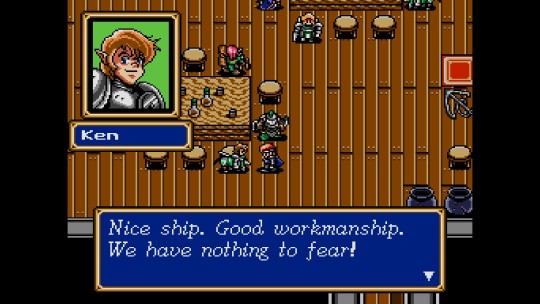
Luke: english version is accurate
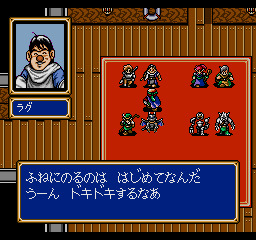

Tao:
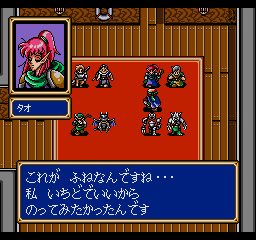
"So this is a ship... I've always wanted to ride on one at least once."

Hans:
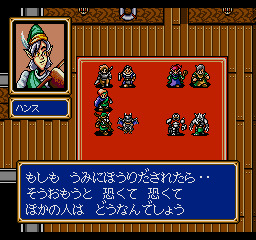
"What if I'm thrown into the sea... When I imagine that I get so, so scared. I wonder how the others feel."
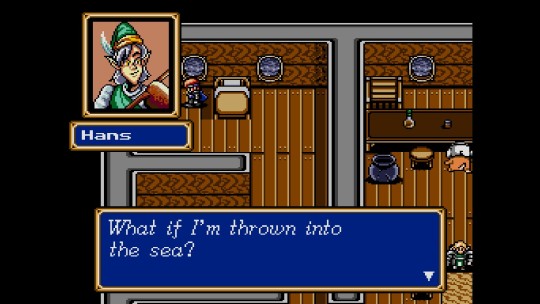
Lowe:

"Unnngh, I feel sick... It'd be great to learn a spell that could heal seasickness..."


"Traveling by ship is great too... If you lend an ear to the sounds of the waves, you can hear the words of the ocean."
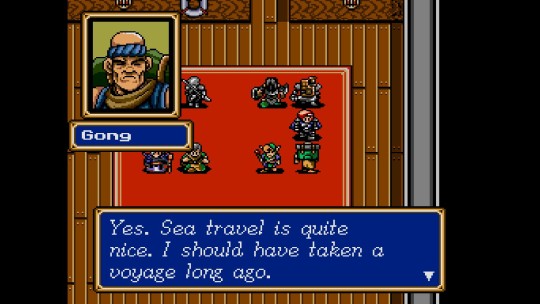
Gort: english version is accurate
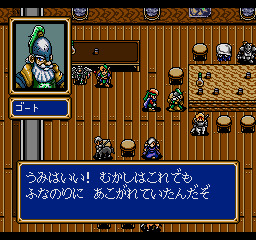
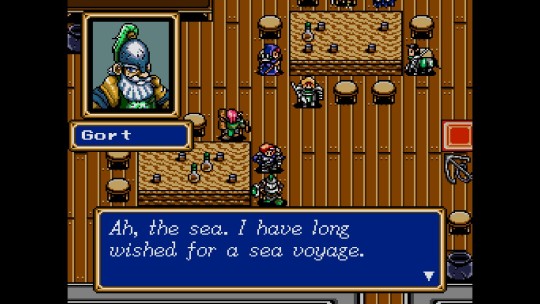
This might contradict the GBA version, where Gort has a tragic story involving the ocean, and is not thrilled to battle at sea.
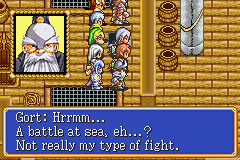
Of course, disliking to fight at sea isn't the same as dislike the sea, though. At the same time, Max’s diary also portrays him as seasick, so it does feel like the writers really had different ideas on this.
Mae: english version is accurate save for changing her intonation at the end


Khris:

"The others seem to be sick. Maybe I should’ve given them some medicine."
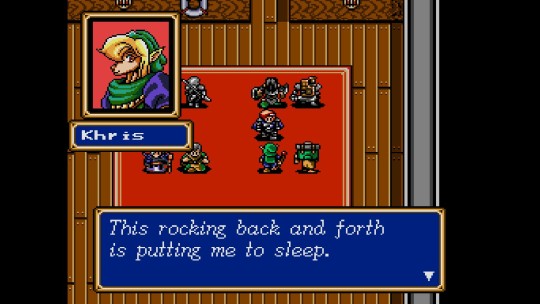
Anri:
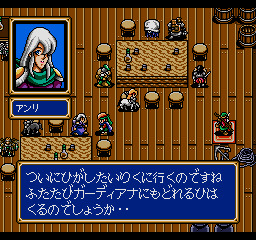
"We're finally going to the eastern continent. I wonder if we'll ever see Guardiana again..."
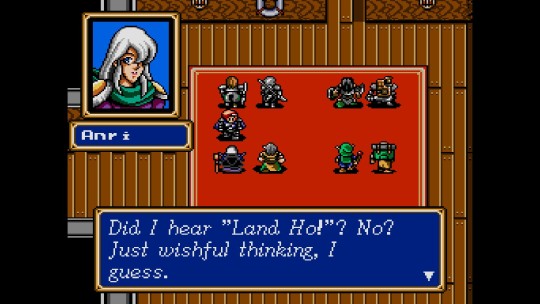
Arthur:
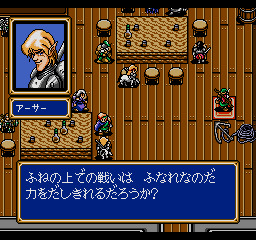
"I have no experience fighting on a ship. Will I be able to fight well?"
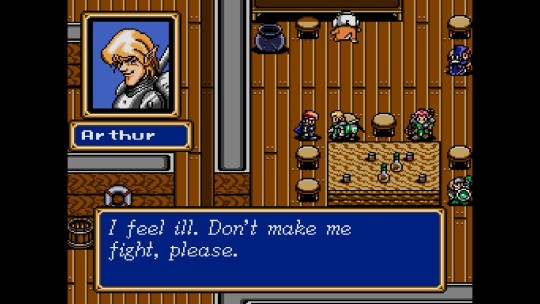
Balbaroy: english version is mostly accurate, though I feel JP Balbaroy is a little pushier/passive aggressive

"Those of use who can fly are great in sea battles. Doesn't hurt to keep that in mind."
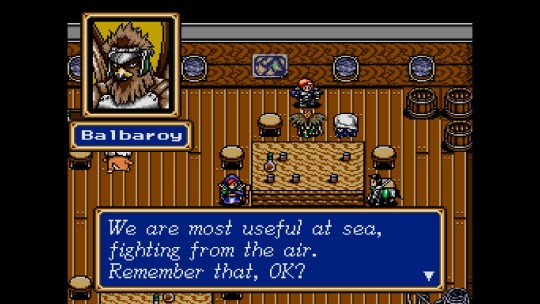
Amon:
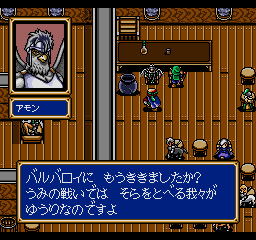
"Has Balbaroy already talked to you about this? We are very helpful in sea battles since we can fly."
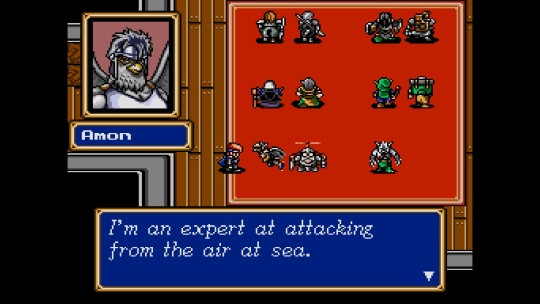
Diane:
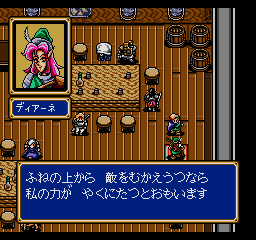
"I bet my skills will be useful to intercept enemies from here on the ship."

Zylo:

"I can't relax while on this ship. It's far too different from a forest..."
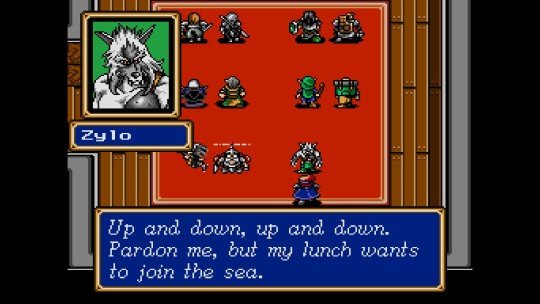
Pelle:

"We knights might not be that good at a sea battle..."

Yogurt:
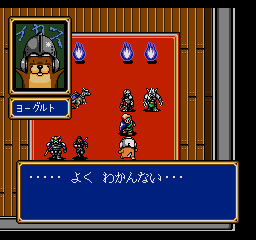
“…I don’t get it…”

As usual, Yogurt gets always the same line in japanese, while the localization decides to remove the gag and pretend he's a normal character.
Kokichi:

"Oh, I'm worried. What will I do if I fall to the sea? I can't swim..."
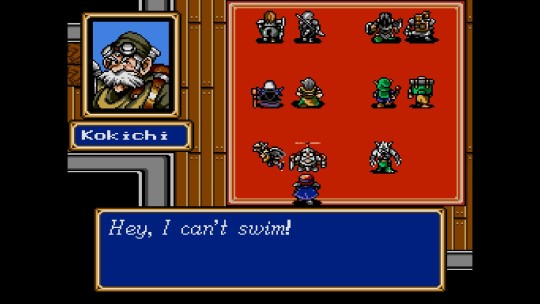
Vankar:

"Uugh, I feel sick... No, no, not from drinking, it's the sea."
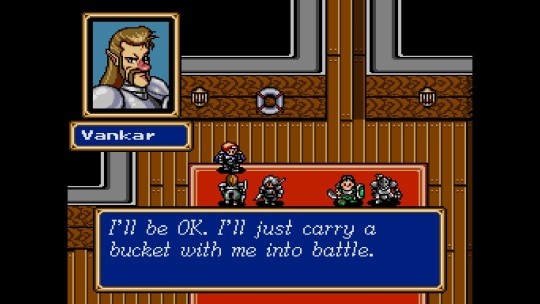
Domingo:

“Ahem. Did yu know? No one here believs it but, the ocean and wivers are connected."
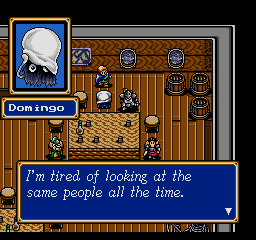
Guntz:

"I hate the sea! I mean, my engine and armor are all gonna rust here."

Earnest:
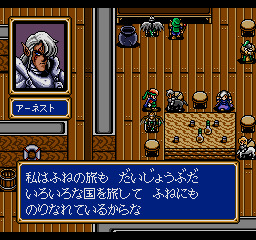
"I'm fine with sea voyages. Since I've traveled through many other countries, I've been in ships before."

Alef:
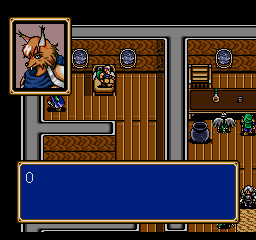
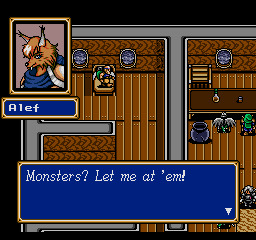
As I’ve shown yesterday, Alef has a line set up for this HQ in the US version of the game even though she’s not normally available at this point (both screenshots above are using Debug Mode). I have now confirmed the same doesn’t happen in the JP version, where she has an empty “0“ string like the other late game characters (Torasu, Lyle, Bleu, Musashi, Hanzou, and Adam).
Finally, the JP version also has an extra tidbit about Queen Koron having sent the ship’s priest:


"I'm a priest. Queen Koron of Pao asked me to come along you in this ship. Sea voyages can be dangerous, so I hope someone like me can be of help to you."
#shining force#shining series#shining force localization stuff#long post#shining force hq quotes#tumblr almost failed to post or even save this due to the number of images and baby? i was about to cry#thankfully messing around with the html and markdown edit modes seem to have fixed#even if i had to fix the formatting later#still better than reuploading all these pics#also man. they wanted tao to be pyra so bad#i too love a fiery girlboss but maybe let this one be herself#vankar's localized line on the other hand does kill me every time#they tried to be funnier with a lot of these and boy did they succeed on that one#it's still in character as well#now i wonder if the oddity with alef is just that someone in the US team liked her very much lol#all characters seem to have their own pointer for this string so maybe guy played with her on debug mode#and just said 'screw it i do what i want'#'i don't care that we have to economize byte space i want my fox girlboss to murder'#i do respect that tbh#it's not like those bytes alone could fix the rest of the translation
2 notes
·
View notes
Text
While I'm writing things that I've been intending to write for a while... one of the things that I think that a lot of people who haven't been involved in like... banking or corporate shenaniganry miss about why our economy is its current flavor of total fuckery is the concept of "fiduciary duty to shareholders."
"Why does every corporation pursue endless growth?" Fiduciary duty to shareholders.
"Why do corporations treat workers the way they do?" Fiduciary duty to shareholders.
"Why do corporations make such bass-ackwards decisions about what's 'good for' the company?" Fiduciary duty to shareholders.
The legal purpose of a corporation with shareholders -- its only true purpose -- is the generation of revenue/returns for shareholders. Period. That's it. Anything else it does is secondary to that. Sustainability of business, treatment of workers, sustainability and quality of product, those things are functionally and legally second to generating revenue for shareholders. Again, period, end of story. There is no other function of a corporation, and all of its extensive legal privileges exist to allow it to do that.
"But Spider," you might say, "that sounds like corporations only exist in current business in order to extract as much money and value as possible from the people actually doing the work and transfer it up to the people who aren't actually doing the work!"
Yes. You are correct. Thank you for coming with me to that realization. You are incredibly smart and also attractive.
You might also say, "but Spider, is this a legal obligation? Could those running a company be held legally responsible for failing their obligations if they prioritize sustainability or quality of product or care of workers above returns for shareholders?"
Yes! They absolutely can! Isn't that terrifying? Also you look great today, you're terribly clever for thinking about these things. The board and officers of a corporation can be held legally responsible to varying degrees for failing to maximize shareholder value.
And that, my friends, is why corporations do things that don't seem to make any fucking sense, and why 'continuous growth' is valued above literally anything else: because it fucking has to be.
If you're thinking that this doesn't sound like a sustainable economic model, you're not alone. People who are much smarter than both of us, and probably nearly as attractive, have written a proposal for how to change corporate law in order to create a more sensible and sustainable economy. This is one of several proposals, and while I don't agree with all of this stuff, I think that reading it will really help people as a springboard to understanding exactly why our economy is as fucked up as it is, and why just saying 'well then don't pursue eternal growth' isn't going to work -- because right now it legally can't. We'd need to change -- and we can change -- the laws around corporate governance.
This concept of 'shareholder primacy' and the fiduciary duty to shareholders is one I had to learn when I was getting my securities licenses, and every time I see people confusedly asking why corporations try to grow grow grow in a way that only makes sense if you're a tumor, I sigh and think, 'yeah, fiduciary duty to shareholders.'
(And this is why Emet and I have refused to seek investors for NK -- we might become beholden to make decisions which maximize investor return, and that would get in the way of being able to fully support our people and our values and say the things we started this company to say.)
Anyway, you should read up on these concepts if you're not familiar. It's pretty eye-opening.
18K notes
·
View notes
Text
.
#feeling school trauma again and like#I’d probably have done a lot better if I hadn’t been forced to do 13 GCSEs instead of the standard 9#and I’d have then 100% pass grades#and could’ve done what I wanted to at college#but people who had less GCSEs than me were prioritised because they passed say all 8 of theirs#but cos I got a D grade in a couple of subjects#and straight up failed one because the teacher left and they didn’t get a replacement#i had a worse average even though I still had more !#so then I had to study subjects I didn’t like and didn’t work for me#I’m mad#the trajectory could’ve been different#economics was my fave subject and I was one of the top in my year#but they wouldn’t let me do it#fuming#sorry I also just discovered GCSEs are equivalent to a high school diploma in the US#which is odd to me#like it sounds significantly easier#also like. I didn’t have a choice cos my Polish cousin did 13 GCSEs too but got all a*s apparently#but also her education cost like 60k a year so you’d hope so
0 notes
Text
NO MARIELLA OR TSP ART BUT I HAVE MY SILLY LITTLE GAY PPL OCS
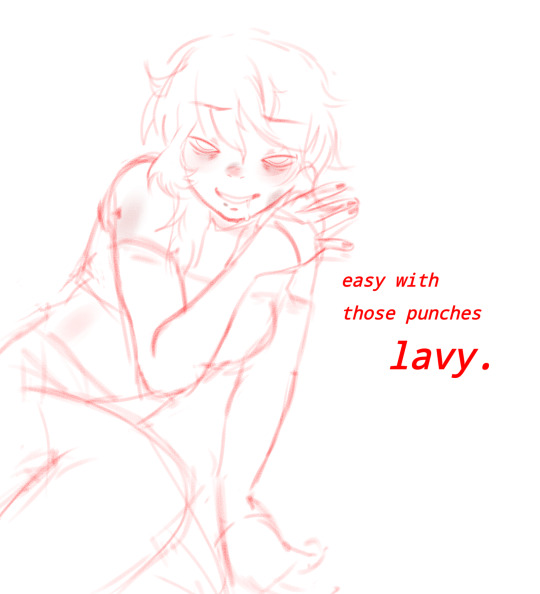


hugo (firsf panel) is a loser in love w her gf btw. absolute failure.
tfw ur wife is insane over u showing a lil emotion while u two hav a sparring match.
this is so funny theyre the most functional and sane (both as individuals and as a relationship) but hugo jus likes being dramatic. also hes the average philosophy major. wackass fuckin hag.
cw under the cut, slight undefined nvdity. nothing much jus tibbies nd like some top surgery scars.

shes so tired of her :333
#should i make a tag for this...#sillies but by me#thats rhe besf ull get im sorry#anw ion hav much context for these ocs except for their personalities and some backstory imnsrill rewriting#anw the series name is cadaver hospital so make do w rhat what u will#candygore silliness is the main aspect of the series btw :33#this is so funny im so insane iver them they literally appear maybe like 3 times in the first book of the series#i also made these ocs when i was like. 11. so im reworking sm#next up in line r probably the puppy nurse the traumatised pharmacist nd uhhh normal teacher whos a normal home economics teacher.#hugo and lav r jus a philosophy liker writer nd a fucken receptionist.#thats all they r.#k may have drawn rhem w them being hyped up#theyre not its just two girlfails uhh failing.#she/he any for hugo and she/they for lav btw#lav drc but like in a idk shes jus what ive been feelin like but if u wanna use other do whtvr but she they ig#hugos is more of idk dare to guess bender of all social rules regarding gender#the fuck gender wives
1 note
·
View note
Text
The director of the New York Office of the High Commissioner for Human Rights of the UN (UN OHCHR), Craig Mokhiber, has resigned in a letter dated 28 October 2023
the resignation letter can be found embedded in this tweet by Rami Atari (@.Raminho) dated 31 October 2023.
The letters are here:
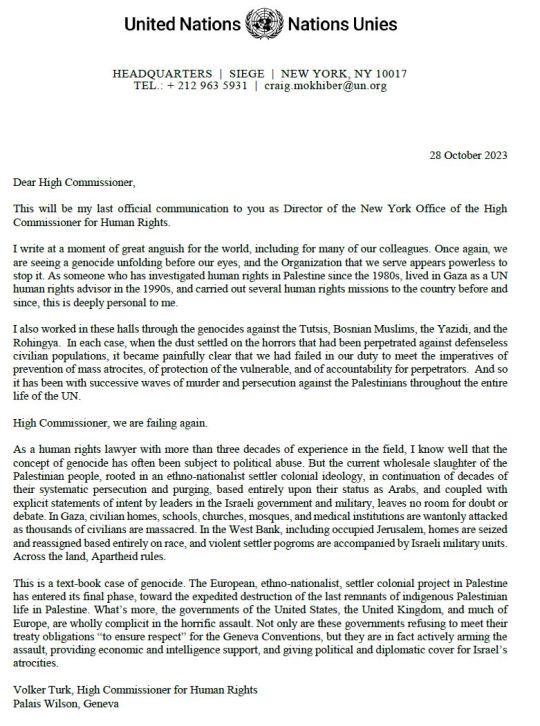
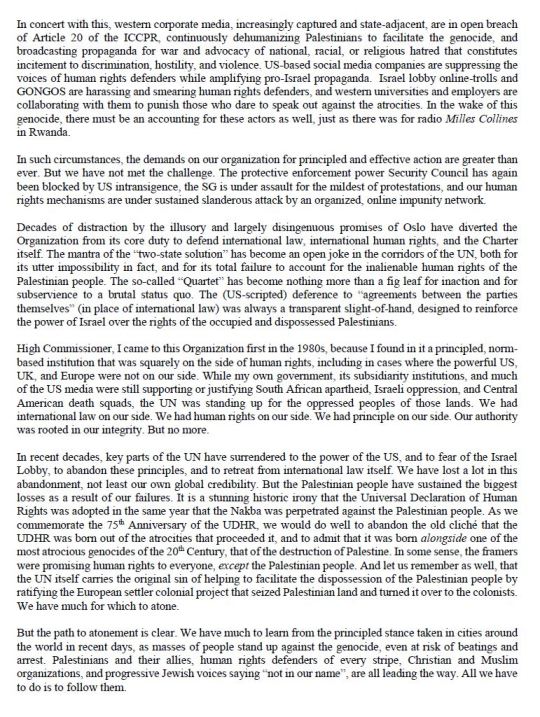
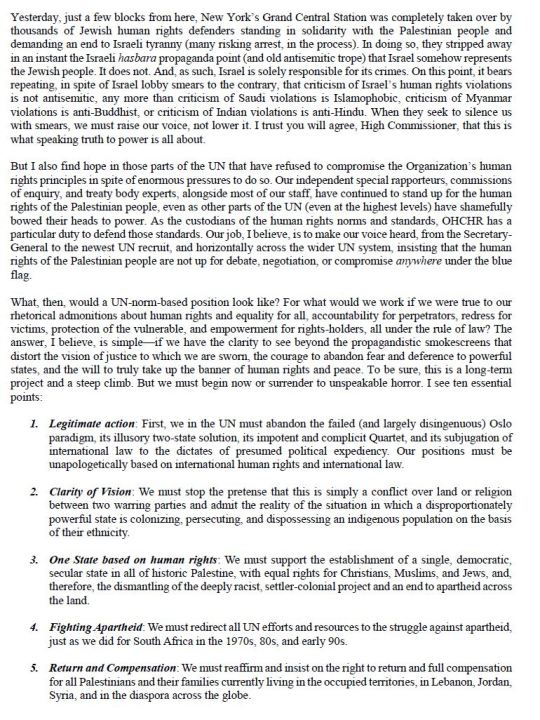
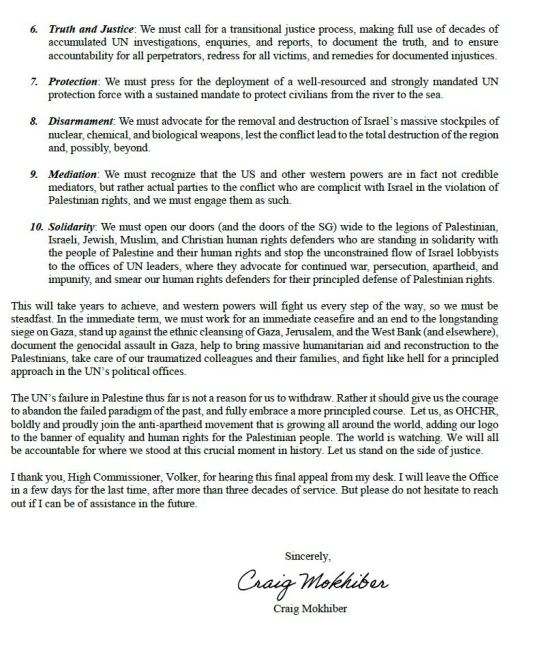
Transcription:
United Nations | Nations Unies
HEADQUARTERS I SIEGE I NEW YORK, NY 10017
28 October 2023
Dear High Commissioner,
This will be my last official communication to you as Director of the New York Office of the High Commissioner for Human Rights.
I write at a moment of great anguish for the world, including for many of our colleagues. Once again, we are seeing a genocide unfolding before our eyes, and the Organization that we serve appears powerless to stop it. As someone who has investigated human rights in Palestine since the 1980s, lived in Gaza as a UN human rights advisor in the 1990s, and carried out several human rights missions to the country before and since, this is deeply personal to me.
I also worked in these halls through the genocides against the Tutsis, Bosnian Muslims, the Yazidi, and the Rohingya. In each case, when the dust settled on the horrors that had been perpetrated against defenseless civilian populations, it became painfully clear that we had failed in our duty to meet the imperatives of prevention of mass atrocites, of protection of the vulnerable, and of accountability for perpetrators. And so it has been with successive waves of murder and persecution against the Palestinians throughout the entire life of the UN.
High Commissioner, we are failing again.
As a human rights lawyer with more than three decades of experience in the field, I know well that the concept of genocide has often been subject to political abuse. But the current wholesale slaughter of the Palestinian people, rooted in an ethno-nationalist settler colonial ideology, in continuation of decades of their systematic persecution and purging, based entirely upon their status as Arabs, and coupled with explicit statements of intent by leaders in the Israeli government and military, leaves no room for doubt or debate. In Gaza, civilian homes, schools, churches, mosques, and medical institutions are wantonly attacked as thousands of civilians are massacred. In the West Bank, including occupied Jerusalem, homes are seized and reassigned based entirely on race, and violent settler pogroms are accompanied by Israeli military units. Across the land, Apartheid rules.
This is a text-book case of genocide. The European, ethno-nationalist, settler colonial project in Palestine has entered its final phase, toward the expedited destruction of the last remnants of indigenous Palestinian life in Palestine. What's more, the governments of the United States, the United Kingdom, and much of Europe, are wholly complicit in the horrific assault. Not only are these governments refusing to meet their treaty obligations "to ensure respect" for the Geneva Conventions, but they are in fact actively arming the assault, providing economic and intelligence support, and giving political and diplomatic cover for Israel's atrocities.
Volker Turk, High Commissioner for Human Rights Palais Wilson, Geneva
In concert with this, western corporate media, increasingly captured and state-adjacent, are in open breach of Article 20 of the ICCPR, continuously dehumanizing Palestinians to facilitate the genocide, and broadcasting propaganda for war and advocacy of national, racial, or religious hatred that constitutes incitement to discrimination, hostility, and violence. US-based social media companies are suppressing the voices of human rights defenders while amplifying pro-Israel propaganda. Israel lobby online-trolls and GONGOS are harassing and smearing human rights defenders, and western universities and employers are collaborating with them to punish those who dare to speak out against the atrocities. In the wake of this genocide, there must be an accounting for these actors as well, just as there was for radio Mules Collins in Rwanda.
In such circumstances, the demands on our organization for principled and effective action are greater than ever. But we phave not met the challenge. The protective enforcement power Security Council has again been blocked by US intransigence, the SG [UN Secretary General] is under assault for the mildest of protestations, and our human rights mechanisms are under sustained slanderous attack by an organized, online impunity network.
Decades of distraction by the illusory and largely disingenuous promises of Oslo have diverted the Organization from its core duty to defend international law, international human rights, and the Charter itself. The mantra of the "two-state solution" has become an open joke in the corridors of the UN, both for its utter impossibility in fact, and for its total failure to account for the inalienable human rights of the Palestinian people. The so-called "Quartet" has become nothing more than a fig leaf for inaction and for subservience to a brutal status quo. The (US-scripted) deference to "agreements between the parties themselves" (in place of international law) was always a transparent slight-of-hand, designed to reinforce the power of Israel over the rights of the occupied and dispossessed Palestinians.
High Commissioner, I came to this Organization first in the 1980s, because I found in it a principled, norm-based institution that was squarely on the side of human rights, including in cases where the powerful US, UK, and Europe were not on our side. While my own government, its subsidiarity institutions, and much of the US media were still supporting or justifying South African apartheid, Israeli oppression, and Central American death squads, the UN was standing up for the oppressed peoples of those lands. We had international law on our side. We had human rights on our side. We had principle on our side. Our authority was rooted in our integrity. But no more.
In recent decades, key parts of the UN have surrendered to the power of the US, and to fear of the Israel Lobby, to abandon these principles, and to retreat from international law itself. We have lost a lot in this abandonment, not least our own global credibility. But the Palestinian people have sustained the biggest losses as a result of our failures. It is a stunning historic irony that the Universal Declaration of Human Rights was adopted in the same year that the Nakba was perpetrated against the Palestinian people. As we commemorate the 75th Anniversary of the UDHR, we would do well to abandon the old cliché that the UDHR was born out of the atrocities that proceeded it, and to admit that it was born alongside one of the most atrocious genocides of the 20th Century, that of the destruction of Palestine. In some sense, the framers were promising human rights to everyone, except the Palestinian people. And let us remember as well, that the UN itself carries the original sin of helping to facilitate the dispossession of the Palestinian people by ratifying the European settler colonial project that seized Palestinian land and turned it over to the colonists. We have much for which to atone.
But the path to atonement is clear. We have much to learn from the principled stance taken in cities around the world in recent days, as masses of people stand up against the genocide, even at risk of beatings and arrest. Palestinians and their allies, human rights defenders of every stripe, Christian and Muslim organizations, and progressive Jewish voices saying "not in our name", are all leading the way. All we have to do is to follow them.
Yesterday, just a few blocks from here, New York's Grand Central Station was completely taken over by thousands of Jewish human rights defenders standing in solidarity with the Palestinian people and demanding an end to Israeli tyranny (many risking arrest, in the process). In doing so, they stripped away in an instant the Israeli hasbara propaganda point (and old antisemitic trope) that Israel somehow represents the Jewish people. It does not. And, as such, Israel is solely responsible for its crimes. On this point, it bears repeating, in spite of Israel lobby smears to the contrary, that criticism of Israel's human rights violations is not antisemitic, any more than criticism of Saudi violations is Islamophobic, criticism of Myanmar violations is anti-Buddhist, or criticism of Indian violations is anti-Hindu. When they seek to silence us with smears, we must raise our voice, not lower it. I trust you will agree, High Commissioner, that this is what speaking truth to power is all about.
But I also find hope in those parts of the UN that have refused to compromise the Organization's human rights principles in spite of enormous pressures to do so. Our independent special rapporteurs, commissions of enquiry, and treaty body experts, alongside most of our staff, have continued to stand up for the human rights of the Palestinian people, even as other parts of the UN (even at the highest levels) have shamefully bowed their heads to power. As the custodians of the human rights norms and standards, OHCHR. has a particular duty to defend those standards. Our job, I believe, is to make our voice heard, from the Secretary-General to the newest UN recruit, and horizontally across the wider UN system, incisting that the human rights of the Palestinian people are not up for debate, negotiation, or compromise anywhere under the blue flag.
What, then, would a UN-norm-based position look like? For what would we work if we were true to our rhetorical admonitions about human rights and equality for all, accountability for perpetrators, redress for victims, protection of the vulnerable, and empowerment for rights-holders, all under the rule of law? The answer, I believe, is simple—if we have the clarity to see beyond the propagandistic smokescreens that distort the vision of justice to which we are sworn, the courage to abandon fear and deference to powerful states, and the will to truly take up the banner of human rights and peace. To be sure, this is a long-term project and a steep climb. But we must begin now or surrender to unspeakable horror. I see ten essential points:
Legitimate action: First, we in the UN must abandon the failed (and largely disingenuous) Oslo paradigm, its illusory two-state solution, its impotent and complicit Quartet, and its subjugation of international law to the dictates of presumed political expediency. Our positions must be unapologetically based on international human rights and international law.
Clarity of Vision: We must stop the pretense that this is simply a conflict over land or religion between two warring parties and admit the reality of the situation in which a disproportionately powerful state is colonizing, persecuting, and dispossessing an indigenous population on the basis of their ethnicity.
One State based on human rights: We must support the establishment of a single, democratic, secular state in all of historic Palestine, with equal rights for Christians, Muslims, and Jews, and, therefore, the dicmantling of the deeply racist, settler-colonial project and an end to apartheid across the land.
Fighting Apartheid: We must redirect all UN efforts and resources to the struggle against apartheid, just as we did for South Africa in the 1970s, 80s, and early 90s.
Return and Compensation: We must reaffirm and insist on the right to return and full compensation for all Palestinians and their families currently living in the occupied territories, in Lebanon, Jordan, Syria, and in the diaspora across the globe.
Truth and Justice: We must call for a transitional justice process, making full use of decades of accumulated UN investigations, enquiries, and reports, to document the truth, and to ensure accountability for all perpetrators, redress for all victims, and remedies for documented injustices.
Protection: We must press for the deployment of a well-resourced and strongly mandated UN protection force with a sustained mandate to protect civilians from the river to the sea.
Disarmament: We must advocate for the removal and destruction of Israel's massive stockpiles of nuclear, chemical, and biological weapons, lest the conflict lead to the total destruction of the region and, possibly, beyond.
Mediation: We must recognize that the US and other western powers are in fact not credible mediators, but rather actual parties to the conflict who are complicit with Israel in the violation of Palestinian rights, and we must engage them as such.
Solidarity: We must open our doors (and the doors of the SG) wide to the legions of Palestinian, Israeli, Jewish, Muslim, and Christian human rights defenders who are standing in solidarity with the people of Palestine and their human rights and stop the unconstrained flow of Israel lobbyists to the offices of UN leaders, where they advocate for continued war, persecution, apartheid, and impunity, and smear our human rights defenders for their principled defense of Palestinian rights.
This will take years to achieve, and western powers will fight us every step of the way, so we must be steadfast. In the immediate term, we must work for an immediate ceasefire and an end to the longstanding siege on Gaza, stand up against the ethnic cleansing of Gaza, Jerusalem, and the West Bank (and elsewhere), document the genocidal assault in Gaza, help to bring massive humanitarian aid and reconstruction to the Palestinians, take care of our traumatized colleagues and their families, and fight like hell for a principled approach in the UN's political offices.
The UN's failure in Palestine thus far is not a reason for us to withdraw. Rather it should give us the courage to abandon the failed paradigm of the past, and fully embrace a more principled course. Let us, as OHCHR, boldly and proudly join the anti-apartheid movement that is growing all around the world, adding our logo to the banner of equality and human rights for the Palestinian people. The world is watching. We will all be accountable for where we stood at this crucial moment in history. Let us stand on the side of justice.
I thank you, High Commissioner, Volker, for hearing this final appeal from my desk. I will leave the Office in a few days for the last time, after more than three decades of service. But please do not hesitate to reach out if I can be of assistance in the future.
Sincerely,
Craig Mokhiber
End of transcription.
Emphasis (bolding) is my own. I have added links, where relevant, to explanations of concepts the former Director refers to.
#Israel#Palestine#October 2023#28 October 2023#United Nations#Described#Long post#I’ll add more links to the things he is talking about later
15K notes
·
View notes
Note
this might be a silly question, but. ive recently learned more about the devastating effects of sanctions on countries like cuba, dprk, or venezuela, and how much unnecessary suffering they cause among the population, especially when it comes to food or medicine shortages. but then bds also calls for sanctions against israel, and im wondering, is there any meaningful difference between that and the sanctions already imposed by the US on other countries? i feel a bit hypocritical when i argue against sanctions while at the same time supporting bds, i feel like they are very different situations with different outcomes but i lack the understanding to really grasp how they are different, if that makes any sense
Sanctions are the systematic blockade of all or certain sectors of trade under military or economic threat by the sanctioner (mostly just the USA in recent history) to any potential agents who might try to ignore the sanction. These sanctions typically include things like medical supplies, food if the country is dependent on imports (like most countries who get sanctioned), electricity, fuel, both light and heavy industry, agricultural products and machines, the global financial system, and other such key sectors. These sanctions, overwhelmingly, only serve to impoverish the country, create undue suffering and political strife. This political strife/instability is usually the main goal of sanctions, to destabilize the target government. However, this political instability more often than not does not result in a magical restoration of "democracy" or "human rights", it usually leads the country down a path of further isolationism and political violence that only worsens its general situation. It also makes it much easier for factions like ISIS to gain popularity and support, since people are desperate. Sanctions are inhumane measures which only makes a country suffer for no good reason. The sanctioners know this, they don't care, and I'd wager that suffering is often the actual point of these sanctions. What has the 60 year old blockade achieved in Cuba? It has only caused pointless poverty, and the stated goal of the sanctions, which is to ultimately remove the communist government, has failed, is failing, and Cuba is managing to make due with what they have.
BDS call for sanctions mostly in regards to military equipment and related products/services, for NATO to stop aiding the genocide, or the banning of Israel from international events such as the olympics. No Israeli will ever go hungry because they no longer get European-made ordinance or because they don't get to participate in Eurovision. This is what BDS says in their Sanctions and governments campaign (which is behind two menus, this is also not the main focus of BDS, by far):
The BDS movement calls for sanctions against Israel, similar to the sanctions that were imposed against apartheid South Africa. These sanctions could include a military embargo, an end to economic links and the cutting of diplomatic ties. In the meantime, the BDS movement is calling for states to take steps to meet their legal obligations not to be complicit in the commission of particular Israeli crimes and not to provide recognition, aid or assistance that help Israel maintain its regime of settler colonialism, apartheid.. This includes, for example, the obligation for states to immediately end to all trade that sustains illegal Israeli settlements in the Occupied Palestinian Territory and the suspension of free trade agreements and other bilateral agreements with Israel.
Notice the greater emphasis on military and diplomatic ties, and how economic/trade sanctions are only called for when it «sustains illegal Israeli settlements in the Occupied Palestinian Territory». Sure, this will (if it is ever adopted by Israel's significant trade partners) cause some suffering for the poor illegal settlers who had just moved into their shiny new apartment blocks built atop acres of land that sustained the surrounding Palestinian villages. The mere existence of these settlements cause more suffering than any sanction could ever cause.
Calling for these sanctions against Israel, which again, don't even come from comparable agents, are both less harmful towards the total population of Israel, and occur in a completely different context. I'm not going to pretend I care about the wellbeing of settlers whose houses didn't even exist 10 years ago. If these sanctions ever do occur in a significant enough scale (dubious), and those settlers don't want to find themselves in a food desert because Carrefour closed all their stores in the west bank, they shouldn't have moved into land stolen from a people facing genocide in the first place. We're also wagering hypothetical and non-global suffering against the now more than 100,000 dead Palestinians in Gaza in the past year, not even counting those who died ever since the first Nakba.
Like BDS points out, these types of grassroots and targeted boycotts/sanctions worked in South Africa, and the white South Africans didn't even suffer that much. Wager these short-lived and targeted sanctions against these other half-century long sanctions sustained by the US' strongarm policy that have prevented basically anything from getting into Cuba or the DPRK.
While those two things are both called sanctions, they have radically different objectives, methods, range, timescale, and character. I can't reiterate this enough, the North Korean collective farmer and the Israeli settler in the west bank have nothing in common when it comes to their position. Only one of them is complicit in genocide through their own actions, only one of them has any degree of blame, and only one of their governments is actually doing anything that warrants any kind of international action. And again, the BDS strategy focuses much more on military sanctions. Let's also be practical for a second, and acknowledge that the US is never going to withdraw their support for Israel, and especially will never sanction Israel. Israel is simply never going to face the same kind of sanctions that Venezuela or Cuba are facing, nor with the same severity, nor with the same restrictions on products essential for life.
777 notes
·
View notes
Video
youtube
Who’s to Blame for Out-Of-Control Corporate Power?
One man is especially to blame for why corporate power is out of control. And I knew him! He was my professor, then my boss. His name… Robert Bork.
Robert Bork was a notorious conservative who believed the only legitimate purpose of antitrust — that is, anti-monopoly — law is to lower prices for consumers, no matter how big corporations get. His philosophy came to dominate the federal courts and conservative economics.
I met him in 1971, when I took his antitrust class at Yale Law School. He was a large, imposing man, with a red beard and a perpetual scowl. He seemed impatient and bored with me and my classmates, who included Bill Clinton and Hillary Rodham, as we challenged him repeatedly on his antitrust views.
We argued with Bork that ever-expanding corporations had too much power. Not only could they undercut rivals with lower prices and suppress wages, but they were using their spoils to influence our politics with campaign contributions. Wasn’t this cause for greater antitrust enforcement?
He had a retort for everything. Undercutting rival businesses with lower prices was a good thing because consumers like lower prices. Suppressing wages didn’t matter because employees are always free to find better jobs. He argued that courts could not possibly measure political power, so why should that matter?
Even in my mid-20s, I knew this was hogwash.
But Bork’s ideology began to spread. A few years after I took his class, he wrote a book called The Antitrust Paradox summarizing his ideas. The book heavily influenced Ronald Reagan and later helped form a basic tenet of Reaganomics — the bogus theory that says government should get out of the way and allow corporations to do as they please, including growing as big and powerful as they want.
Despite our law school sparring, Bork later gave me a job in the Department of Justice when he was solicitor general for Gerald Ford. Even though we didn’t agree on much, I enjoyed his wry sense of humor. I respected his intellect. Hell, I even came to like him.
Once President Reagan appointed Bork as an appeals court judge, his rulings further dismantled antitrust. And while his later Supreme Court nomination failed, his influence over the courts continued to grow.
Bork’s legacy is the enormous corporate power we see today, whether it’s Ticketmaster and Live Nation consolidating control over live performances, Kroger and Albertsons dominating the grocery market, or Amazon, Google, and Meta taking over the tech world.
It’s not just these high-profile companies either: in most industries, a handful of companies now control more of their markets than they did twenty years ago.
This corporate concentration costs the typical American household an estimated extra $5,000 per year. Companies have been able to jack up prices without losing customers to competitors because there is often no meaningful competition.
And huge corporations also have the power to suppress wages because workers have fewer employers from whom to get better jobs.
And how can we forget the massive flow of money these corporate giants are funneling into politics, rigging our democracy in their favor?
But the tide is beginning to turn under the Biden Administration. The Justice Department and Federal Trade Commission are fighting the monopolization of America in court, and proposing new merger guidelines to protect consumers, workers, and society.
It’s the implementation of the view that I and my law school classmates argued for back in the 1970s — one that sees corporate concentration as a problem that outweighs any theoretical benefits Bork claimed might exist.
Robert Bork would likely regard the Biden administration’s antitrust efforts with the same disdain he had for my arguments in his class all those years ago. But instead of a few outspoken law students, Bork’s philosophy is now being challenged by the full force of the federal government.
The public is waking up to the outsized power corporations wield over our economy and democracy. It’s about time.
2K notes
·
View notes
Text

°୨୧ INEVICABLY, UNDENIABLY
+ gojo satoru x f!reader | wc 3.3k | content: fluff, modern au, friends to roommates to lovers, timeskip thing; from high school -> adulthood, alcohol, implied sex, children, marriage, gojo is mostly clingy and annoying and we love him for it, the years and age correspond to his actual birthdate, take this as my birthday fic for him <3
summary: despite seemingly having it all, gojo satoru’s goal has always been the same all these years you’ve known him—all he wants in life is you, and only you. during his birthday this year, gojo counts his blessings.

2006; seventeen.
the day you agreed to be satoru’s partner in homeroom class is the day you signed away your sanity. not because satoru’s hard to get along with or that he’s rude or slacks off, but because it’s hard not to fall for a boy with such pretty eyes and even prettier lips who likes to say the most beautiful things.
getting to know satoru is like taking a deep in the clearest, coldest ocean after an entire lifetime of being dipped in molten lava. he’s annoying, refreshing and eye-opening all in one.
satoru shows promise in the first lesson, doing fairly well at cooking and sowing, although afterwards he just falls off because you end up having to teach him how to properly use alcohol in his cooking so he doesn’t burn himself or that you’d end up patching his fingers up since he accidentally pokes himself a lot more than the average human would.
still, it’s not his fault he isn’t naturally talented in the home economics department. he is in sports, you find out, after a few months of being in the same class as him.
“hey, y/n.” he’s leaning back on his chair, depending on its hind two legs for support. it’s become his habit during class to bother you whenever the teachers aren’t in.
you were assigned the seat diagonally behind him, and it’s become a habit for you to ignore him—mostly because most of the time, it’s nonsense that falls out of those lips, especially after you’d gotten close. it’s his sign of affection, you realise.
“hey y/n, i’m being serious this time, i need to talk to you,” satoru whines, pouting and sighing in that over dramatic way that only he can.
that’s also not the first time he’s tricked you into acknowledging him so all you do is look at him, a smile appearing that you failed to suppress, and bring a finger to your lips, signalling for him to hush.
unperturbed, satoru smirks and gets to scribbling on a piece of paper, folding it (annoyingly and quickly) into a swan before handing it to you. he winks at you, and you’re immediately driven not to give him satisfaction by reading it. instead, you bow slightly and stuff it in your pencil case, making satoru pout again and giving yourself the sweet taste of victory.
the rest of your sophomore year in high school, you find yourself growing closer to satoru, an unfamiliar feeling growing inside of you. you find that you like knowing what makes him tick, and even the way he says your name, or even watching him ace every kind of sport and then having him blow a teasing kiss to you after each win.
“y/n, i’m so jealous of you, how’d you manage to get gojo satoru of all people?” one of your classmates whine, swooning endlessly over him.
you only laugh it off, deigning to think too much of it.
it’s weird; he’s most of the schoolgirls’ crushes, but you’ve never considered him to be yours. maybe it’s just a fleeting feeling that will go away with the test of time.
yeah, that should be all that is.

2007; eighteen.
“why not? we’re practically going to the same college.”
with time, you thought that maybe satoru would become a little more sane. like how growing into adults, you slowly shed the ridiculous dreams you had as a child. but he’s not, if not—he’s even more insane.
“we haven’t got the results yet, satoru.”
“i’m pretty sure we’ll get in though.”
“and what’s your basis for that?”
“i’m never wrong about these.”
as always, satoru lives in his own little bubble and you can’t help but to sigh. in his head, both of you will get into that same college you applied for and he has it all planned out: “we get into college, sign up for whatever classes, and then rent an apartment together—genius right?”
that was satoru just moments ago, elbows leaned over the grocery cart as he grins at you, beaming like a dog waiting for their owner’s approval. now he’s still doing the same, except you’ve flicked him on the forehead before turning your attention to the aisles because apparently, he says he hates the food at home and would rather have what you’re cooking.
he’s made it his life mission to invade your meals over the weekend, squeezing himself into your family, bonding with your sibling and your parents and only then did you realise what you forgot in the first place: satoru is one of the most charming people to ever walk the earth. your siblings constantly ask about the next time he’s coming over, and your parents are just waiting for you to announce that he’s your boyfriend—which he’s not, but he sure likes to make it seem that way.
another thing you notice about satoru thanks to your now-weekly grocery runs: he likes to wander around way too much, and complains afterwards when he finds you after losing you.
“y/n!”
it’s like routine by now; the way satoru rushes over to you, putting his arm around your shoulder and sticking his cheek against yours, telling you how he almost died because he thought he lost you—like the drama queen he is. by now, all you can offer him is a ruffle of his hair before you carry on like normal, as though your heart isn’t beating right out of your chest from that simple proximity.
because satoru, despite his generally icy look, is always warm; his body heat, his cheeks, the way he looks into your eyes all the time, even his fingertips when they brush against you.
you think he’s especially warm when he falls asleep beside you after watching a late night movie, his head nuzzled in your neck, hands somehow rested over your own. your favourite thing about the friendship, though, try as you might to deny it, is how satoru’s hands always find yours when he walks you home, fingers lacing around your own as if it’s second nature.
ever since then, these routines have become a staple, and perhaps even does your growing feelings. the inexplicable one.

2008; nineteen.
satoru was right.
both of you did get into the same university, and the same course, with different minors so at least there’s some differences. so of course, satoru did not let the shared apartment idea go. though, of course, thanks to your initial hesitance on the matter, the only available apartment is a 4-bedroom, entirely too big and hence you’d convinced satoru to just rent the other bedrooms out for extra change.
and no, satoru does not need extra change because his family’s loaded (which you realised you didn’t even know before this) but at least this would allow you to not dwell on whatever you’re feeling too much. university is going to be stressful enough without the added consideration of your possible feelings towards satoru.
then enters geto suguru—your new roommate who, thankfully, steals enough of satoru’s attention so you have some breathing room. turns out, they’re like two peas in a pod. but while you and satoru major in business, suguru majors in psych. so that still means satoru’s around just you most of the time.
some routines change; like how movie nights are shared amongst the three of you in the living room instead of just you and satoru in your room. or how during grocery runs satoru still runs up to you when he finds you again except this time, an exasperated suguru is beside you sighing at him, always a “how do you stand this guy?” rolling off his tongue. the most surprising one for you might be how meals include suguru now and satoru’s the one who does the cooking now, and funnily enough, he’s absolutely great at it. no ounce of hesitation as he flips the pancakes, or stirs the fried rice—no whining about how it’s too hard because he’ll get burns on his fingertips and has to ask you to tend to his wounds.
but some change in a different way. they leave no room for someone else, like how satoru always finds your hands to hold on to, keeping you within a reach too close to pass as just friends but both of you refusing to label it anything else anyways. it leaves no room for other people to butt in and whisk either of you away.
and for now, at least, both of you are okay with just that.

2009; twenty.
participating in different activities and clubs inevitably mean that you and satoru wouldn’t be attached at the hip most of the time. and of course, while that leads to satoru becoming even clingier when you’re both home (not that you’re complaining when it’s nice to feel wanted from the very guy you’re completely not having a crush on), both of you are in separate social circles.
satoru occasionally has his friends over, the ones you don’t really know that well. the one where you can only remember names like haibara because he’s extra friendly and yuki because she’s one of the prettiest people you’d ever seen and nori because she’s a mix of the two. you’re nice, and cordial to all of them, although you can’t really say the same for satoru.
occasionally you and suguru invite your friends over, because nicely enough, you both have the same interests. it’s mostly shoko and nanami, a med student and law student respectively, but both of which satoru loves to annoy to no end. lucky for you, shoko is strangely naturally tolerant of his antics and nanami shrugs it off as white noise.
“y/n, surely you’d rather spend time with me rather than that blondie?” satoru always asks, pouting as he looks at you over his shoulder during breakfast—a constant whenever you have plans that involve nanami.
it’s kind of cute.
“mmm, that’s a secret,” you’d always tell him, knowing that satoru’s pouts won’t last all day anyway. it’ll relegate to an excited grin whenever you’re back after that.
you’d never really had to face your feelings, then, until all of you gather one night, before the holidays officially start. you should’ve known that something would be different this time, especially when there’s alcohol involved. naturally, in the circle you sit in, satoru asks people to scoot over, purposely sitting beside you, as close as he can, close enough that your arms and knees practically brush.
it’s just for a simple game of truth or dare, and it’s innocent enough until someone asks nanami and he says truth, and his truth is that out of everyone he knows, he’d most likely date you. beside you, while everyone else is whooping at the declaration, satoru clicks his tongue in annoyance, though he says nothing about it. and you’re not really emphatic about it until someone dares nori to kiss the guy she wants to date the most and she kisses satoru, deep and slow, in front of you, haibara letting slip that she’s had a crush on satoru for a while now.
satoru’s five shots in and tipsy and he was imagining that was you and maybe that’s why it lasted for five seconds before he pulls away.
and when it comes to satoru?
as though noticing his dilemma, suguru gives an amused smile as he states his dare, “kiss the girl you most wanna marry.”
he doesn’t waste a single second in pulling you close and kissing you, his alcohol-tainted lips pressing against yours, daring tongue teasingly prying open your lips, chuckling as he feels you kiss him back.
“not most,” satoru corrects right as the both of you pull away, his forehead still pressed against yours and both of your half-lidded pair of eyes still staring at each other.
“what?” you’re almost breathless, forgetting that everyone else is watching.
“the only girl i wanna marry.” and you think he’s never looked more handsome, genuine smile plastered on his face and pretty blue eyes threatening to pull you in.
while everyone moves on, satoru doesn’t—he keeps you there with him, telling you for the first time in four years since he’s known you, “i love you.”
the next week, after you get home for the holidays, the first time being away from satoru in a while, you manage to find your old pencil case, the folded paper swan satoru folded for you all those years ago still inside, somehow forgotten.
curious, you finally open it, finding his message enclosed inside, bringing a smile to your face.
i’m gonna marry you one day.

2010; twenty-one.
dating satoru is like finding a new hobby that you’re effortlessly good at.
despite living under the same roof, instead of finding out the ugly, you find the good in each other. even with suguru in the mix, you all live harmoniously like you have been since the start. except now, satoru likes to sleep in your room, both of you fooling around and occasionally forcing suguru to tell you to pipe down.
satoru is still full of surprises, sometimes pulling up with his car as though both of you don’t sleep under the same roof, telling you that he planned a date and to dress nice. he buys you flowers even if you’re not particularly fancy of them and surprises you by buying things that simply reminded him of you.
dating satoru is like finding out that the right person for you will always think of you and your feelings, no matter the circumstance. the way he makes sure to tell you if he has to hang around nori, or the way he asks if you need anything when he passes by the grocery store alone, or going so far as to memorise your cycle so he knows exactly what to show up back home with.
by the time it’s your one-year anniversary and his birthday comes and you ask him what he wants, all he can answer is “you” and for the first time, you can tell he isn’t trying to be annoying or cheeky or flirty—satoru is surprisingly simple and his answer always has been and somehow always will be just you.

2013; twenty-four.
you still remember the day satoru got down on one knee, his handsome smile even more radiant under the golden hour glow, those still-beautiful blue eyes gleaming even from beneath his bangs.
just an intimate proposal with your closest friends, both shoko and suguru helping to distract you in order to create a successful surprise, while nanami and haibara helped with the decorations and photography.
thanks to them, you’re laughing now, at your wedding reception, looking at all the ways you nearly found them out that day, exactly one year ago, in the form of pictures. and thanks to the best man’s toast, you find out that suguru’s always known about satoru’s feelings, and just how deep his emotions for you ran.
“i won’t forget how much he whined about y/n getting close to nanami. that was probably the one time his whining got so out of control that i wanted to stuff a pillow over his face,” suguru divulges, garnering laughs around the hall, including from you, as your new husband pouts and squeezes your hand.
thanks to that, nanami finds the need to disclose during his speech, “i have never intended to date nor had such thoughts about y/n. my truth during that game of truth or dare was simply the result of a process of elimination—” and haibara cuts him off to give a more fitting speech, fits of laughter all across the room.
that day, you steal glances at satoru, wondering how you got so lucky to be with someone who loves you so much and continuously proves so with every passing day.
“satoru?” you call to him softly that night, as you both find yourselves completely bare in the bedroom of your new apartment, one to yourselves.
his piercing blue eyes flick up to meet yours, relishing how it feels like inside of you, every time as though it’s the first. “yeah?” it’s breathy, because he’s about to lose himself.
“i love you, satoru, and only you, forever and ever,” you tell him, finally knowing that in this life, it will always be gojo satoru for you, and that it’s the same for him too.
he only chuckles, pulling you close, “forever me and you, baby, only us.”

2023; present day.
“wow, more than ten years, i think i need to give you a trophy for that, y/n.”
satoru groans, rolling his eyes. “what’s that supposed to mean?”
beside him, suguru laughs at shoko’s comment. this time, the six of you find yourselves at a round table in a seafood restaurant during satoru’s birthday, talking about how it’s you and satoru’s tenth year together too.
“i’m not too much, am i?” satoru teasingly asks you, although you only shrug in amusement before drinking your glass of water as an excuse not to answer.
you’ve always been like that, but it’s part of what satoru likes about you. scratch that, he’s loved every part of you since he met you. it’s like it was meant to be; or so he likes to think. there’s an undeniable pull that always lulls him back to you. to satoru, there’s never been question that you’re the only one for him, maybe that’s why it’s so clear-cut.
“you’re just so head over heels for me, huh?” you ask him, a smug grin on your face, the conversational context something he’s missing since he’s been zoning out in his thoughts.
since the first time he saw you, he’s been drawn to you every second of every day. maybe that’s why he did all those stupid stuff like pretending not to be able to cook and ‘accidentally’ burning himself to get you to tend to him, or purposely pricking himself with the needle and asking you to put a plaster over it just to feel you close. even those times at the supermarket when he purposely loses you so he can find you again and see your helpless smile and feel the way you rub his head affectionately afterwards.
maybe it’s stupid too, how he had to silently admit he knows how to cook all too well because he didn’t want suguru to taste your cooking when he first moved in. it was something satoru felt he wanted to himself, something he wanted to keep between him and his future wife. or how a wordless stare between him and suguru during that game of truth or dare was all suguru needed to know that satoru wanted to make you his at that very second, afraid that kiss between him and nori would make you hesitant.
he shouldn’t have underestimated you though, because you know him better than most people do. there were never any pointless arguments or unrecoverable friction.
as they sing happy birthday annoyingly loud like best friends do, chanting for him to make a wish—his hands find yours again as they always did, he can honestly say that there’s no other way he’d rather live his life. you’re made for him and he has you and the little mini yous at home so really, there’s nothing that he has to wish for.
except, maybe, one thing, if he could be selfish.
in this life, and every other life, he’ll want to be with you and only you, forever.
#jjk x reader#gojo satoru x reader#satoru x reader#gojo x reader#jujutsu kaisen x reader#gojo satoru#jjk fluff#gojo satoru fluff#gojo fluff#gojo x you#gojo x y/n#gojo satoru x you#gojo satoru x y/n#jjk x you#jjk x y/n#jujutsu kaisen x you#jujutsu kaisen x y/n#૪ aeri’s fics !
2K notes
·
View notes
Note
I'm asking this in good faith, but this is something I'm genuinely confused about. Regarding the Holodomor, or the Soviet famine of 1930 in general, why does it matter if it was a genocide or not? At best it seems to be a natural famine exacerbated by poor decision making, and while that is far different from a genocide, I don't understand why that specification matters, because it was still made worse by Soviet intervention, unless I'm getting the facts wrong which I probably am.
It matters to the Western propagandists who were insistent for decades despite zero evidence that the famine was used to commit atrocities against the people of Ukraine. The refrain the whole time was that once the Soviet archives were made public, they'd finally have the proof they needed. The archives are eventually opened, and surprise surprise, there's not only no evidence of the deliberate withholding of grain, there's evidence of significant amounts of food aid being sent to help alleviate the famine. The myth of a Ukrainian genocide began as Nazi propaganda and was adopted as part of the "double genocide" narrative by Western reactionaries after WW2 to downplay the crimes of the Nazis and to maintain a narrative about liberal opposition to "authoritarianism", painting Western capitalists as the "free world" fighting against both fascism and communism. (Don't ask them why they stopped fighting fascism after WW2 though.)
As for the human elements of the famine, it is also part of the typical Western narrative, even among those who admit the Holodomor was not a targeted anti-Ukrainian genocide and who admit that there were environmental factors, to try and put substantial amounts of blame on the Soviet collectivization of agriculture. I am not going to lie and say collectivization went smoothly with no issues, but you cannot ignore the factors of reactionary sabotage by kulaks (including the destruction of animals and grain and the outright murder of party officials) and the effects of Western sanctions and sabotage on the economic development of the USSR.
While some have argued that there was a complete "gold blockade" on the USSR during the famine and so the Soviet Union was forced to export grain to facilitate international trade, the blockade was never enforced by all Western nations at the same time and the Soviets were still able to export gold and silver at various times throughout the 1920s. It is true, however, that gold reserves were stretched thin at the time and the Soviets simply didn't have enough gold to cover their international debts. Soviet gold mines had never been extraordinarily productive and the rest of the Soviet economy was still developing at the time, so grain was one of the few things that they expected to have in surplus. In addition, there were various other sanctions in place by 1930 that did limit who they could trade with and what they could trade with, but the export of grain was almost never restricted. The famine caught them off guard at a very bad time.
While international grain exports were restricted during the famine as grain was diverted to famine-stricken regions of the country (and grain imports were increased as well), the problems with hoarding only worsened as in the panic of the famine, kulaks sought to exploit the people and create a profitable black market on grain. A struggle against the kulaks coincided with worsening environmental effects and the spread of disease among both crops and humans.
The famine was not man-made, it was not entirely natural, and it was not the inevitable outcome of collectivization. It was a perfect storm of a variety of factors. Stalin was not some heartless monster condemning millions of Ukrainians to death for daring to defy the glorious Soviet Union. He was not some idiot who had no idea what he was doing, plunging the nation into famine out of ineptitude. He was not a stubborn maniac who refused to abandon failing economic policies even at the cost of human lives. He was a human being, one of many in charge of the Soviet Union, dealing with concurrent disasters as best as they could.
574 notes
·
View notes